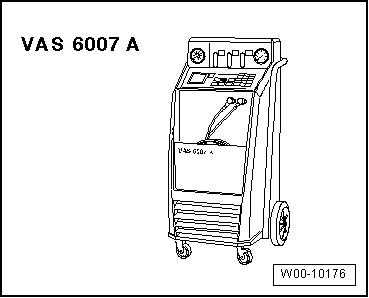Volkswagen Polo Service & Repair Manual: Important Information when Working with the A/C Service Station
 Caution
Caution
| If it is suspected that chemicals were added to the
refrigerant circuit to seal leaks, do not connect the
A/C service station and do not extract the refrigerant. |
| Chemicals that seal leaks in the coolant circuit
form deposits that affect the function of the A/C system
and lead to failure of the A/C system and the A/C
service station. |
| Inform that customer that there are substances in
the A/C system that are no approved by Volkswagen. This
A/C system cannot be drained or serviced in the
workshop. |
|
 Note Note
| The chemical materials (stop leak additive) for sealing
leaks in the refrigerant circuit offered on the market are not
approved by VW Audi AG. There are no permanent- ,validity or
material compatibility tests. Therefore damage or malfunctions
in the A/C system or the A/C Service Station cannot be excluded. |
| The stop leak additives offered on the open market have
different physical and chemical properties, which can impair the
function of the A/C system and the A/C Service Station and can
even shut down the system completely. |
| VW does not approve the use of chemicals to seal leaks in
the refrigerant circuit. |
| Chemicals used to seal leaks in the refrigerant circuit
often react with air and the moisture in it. They cause deposits
in the refrigerant circuit and the A/C service station and
malfunctions in valves and other components that they come in
contact with. These deposits cannot be removed completely from
the components. |
| Chemicals used to seal leaks in the refrigerant circuit
usually cannot be detected from outside. The label that should
be applied to identify it is often missing. Therefore be careful
when working with if you do not know its service history. |
| Accessories offer containers used to separate out these
chemicals (used to seal leaks in the refrigerant circuit).
Because VW does not approve the use of these chemicals, there is
no evidence of the effectiveness of these filters. |
|
|
|
| Note the following when operating the A/C service station
-VAS6007A-. This also applies to other service stations. |
| Refer to the Workshop Equipment Catalog. |
| The filters and dryers installed must be replaced at the
latest on completion of the service life specified in the
relevant operating instructions. |
| Only refrigerant oils that are approved for the refrigerant
circuit in that vehicle may be added. |
| Refer to the Parts Catalog. |
| Extracted refrigerant must not be reused under the following
conditions, even after cleaning in the station: |
| In the case of A/C compressor damage in which the
refrigerant was disintegrated due to overheating. |
| In the case of dark, sticky deposits in the refrigerant
circuit (these can only be found after opening the system). |
| If there is any doubt as to the composition of the
refrigerant extracted from the refrigerant circuit. |
| The A/C service station is to be drained in all these cases.
Refer to
→ Chapter „Discharge Refrigerant Circuit with A/C Service
Station“, the system cleaned if necessary and the
filters, dryers and refrigerant oil replaced. |
| For example, within Germany, contaminated refrigerant can be
returned to the supplier in recycling containers for recycling
or for environmentally safe disposal. Other or additional
regulations may apply in other countries. |
| Commercially available A/C service stations can be
classified in 2 groups: |
| A. A/C service stations which clean extracted refrigerant
for reuse (extraction and recycling stations) such as the A/C
service station -VAS6007A-. |
| B. A/C service stations which transfer extracted refrigerant
to recycling containers (for large-scale recycling). These are
referred to as extraction systems. |
|
|

|
Caution
If it is suspected that chemicals were added to the
refrigerant circuit to seal leaks, do not connect the ...
Other materials:
Valve, Removing and Installing, Valve Explanations
1. Valve Body
1 -
Valve body
2 -
Valve Insert
3 -
Valve cap
The rubber valve for tubeless tires is designed to seal
air-tight in the ...
Cleaning and caring for chrome and aluminium trim parts
First read and observe the introductory information
and safety warnings
Use a damp, clean, lint-free and soft cloth to clean the surfaces.
For heavy soiling use a special solvent-free cleaning product.
Polish the chrome and aluminium trim parts using a soft, dry cloth.
NOTICE
...
Introduction
This chapter contains information on the following subjects:
→ Seat heating
Additional information and warnings:
Adjusting the seat position
Seat belts
Airbag system
Child seats (accessories)
Exterior mirrors
Luggage compartment
WARNING
Incorrec ...
© 2016-2026 Copyright www.vwpolo.net

 Note
Note A/C Service Station, Connecting for Measuring and Testing
A/C Service Station, Connecting for Measuring and Testing
 Caution
Caution
